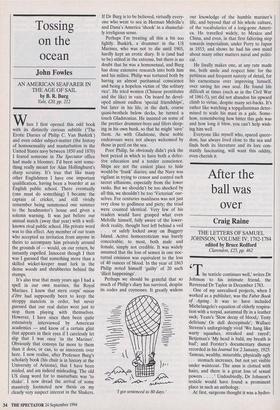Tossing on the ocean
John Fowles
AN AMERICAN SEAFARER IN THE AGE OF SAIL by B. it Burg Yale, £20, pp. 212 When I first opened this odd book with its distinctly curious subtitle (The Erotic Diaries of Philip C. Van Buskirk') and even odder subject-matter (the history of homosexuality and masturbation in the United States navy between 1850 and 1870) I feared someone in The Spectator office had made a bloomer. I'd been sent some- thing really meant for Alan Hollinghurst's sharp scrutiny. It's true that like many other Englishmen I have one important qualification, having been a boarder at an English public school. There eventually (one must do something) I became the captain of cricket, and still vividly remember being summoned one summer to the headmaster's house and given a solemn warning. It was just before our annual match (away that year) with a well- known rival public school. His private word was to this effect. Any member of our team who accepted an invitation from anyone in theirs to accompany him privately around the grounds of — would, on our return, be instantly expelled. Innocent though I then was I guessed that something more than a skilled wicket-keeper must lurk in the dense woods and shrubberies behind the stumps.
It's also true that many years ago I had a spell in our own marines, the Royal Marines. I knew that stern corps' raison d'être had supposedly been to keep the stroppy matelots in order, but never guessed that our real duties were just to stop them playing with themselves. However, I have since then been quite extensively interviewed by American academics — and know of a certain glint that appears in their eyes if I carelessly let slip that I was once 'in the Marines'. Obviously that conveys far more to them than it does, or can, to us innocents over here. I now realise, after Professor Burg's scholarly book (his chair is in history at the University of Arizona), that I have been misled, and am indeed misleading. The old US slang word for to masturbate was 'to shake'. I now dread the arrival of some massively footnoted new thesis on my clearly very suspect interest in the Shakers. If Dr Burg is to be believed, virtually every- one who went to sea in Herman Melville's and Dana's America 'shook' in a shameful- ly irreligious sense.
Perhaps I'm treating all this a bit too lightly. Buskirk, a drummer in the US Marines, who was not to die until 1903, hardly kept an erotic diary. It is (and had to be) stilted in the extreme, but there is no doubt that he was a homosexual, and Burg has done extensive research into both him and his milieu. Philip was tortured both by having an almost puritanical conscience and being a hopeless victim of 'the solitary vice'. He tried women (Chinese prostitutes and the like) in vain. On board he devel- oped almost endless 'special friendships', but later in his life, in the dark, coarse quasi-brothels below decks, he turned a touch Gladstonian. He insisted on some of the prettier drummer-boys and fifers sleep- ing in his own bunk, so that he might 'save' them. As with Gladstone, these noble endeavours were not always welcomed by those in peril on the sea.
Poor Philip, he obviously didn't pick the best period in which to have both a defec- tive education and a tender conscience. Ships are not the easiest place to hide would-be 'frank' diaries; and the Navy was vigilant in trying to censor and control such secret effusions, especially from the lower ranks. But we shouldn't be too shocked by all this, we shouldn't be too 'Victorian' our- selves. For centuries manliness was not just very close to godliness and piety; the triad were counted identical. Very few of his readers would have grasped what even Melville himself, fully aware of the lower- deck reality, thought best left behind a veil . . . or safely locked away on Buggery Island. Active homoeroticism was barely conceivable; to most, both male and female, simply not credible. It was widely assumed that the loss of semen in one noc- turnal emission was equivalent to the loss of 40 ounces of blood. In the year of 1863 Philip noted himself 'guilty' of 20 such `illicit happenings'.
Perhaps we should be grateful that so much of Philip's diary has survived, despite its codes and coynesses. It greatly widens got sentenced to 80 days.' our knowledge of the humble mariner's life, and beyond that of his whole culture, of the vocabularies of a long-gone Ameri- ca. He travelled widely, to Mexico and China, and even, in that first faltering step towards imperialism, under Perry to Japan in 1853; and shows he had his own mind about many other matters naval and politi- cal.
He finally makes one, at any rate made me, both smile and respect him: for the pettiness and frequent naivety of detail, for his earnestness over improving himself, over saving his own soul. He found life difficult at times (such as in the Civil War of 1861-5), yet did not abandon his upward climb to virtue, despite many set-backs. It's rather like watching a topgallantman deter- mined to scale his mast in a gale. Some- how, remembering how bitter this gale was and how long it blew, you can't help wish- ing him well.
Everyone like myself who, spared queer- dom, has always lived close to the sea and finds both its literature and its lore con- stantly fascinating, will want this oddity, even cherish it.


































































 Previous page
Previous page